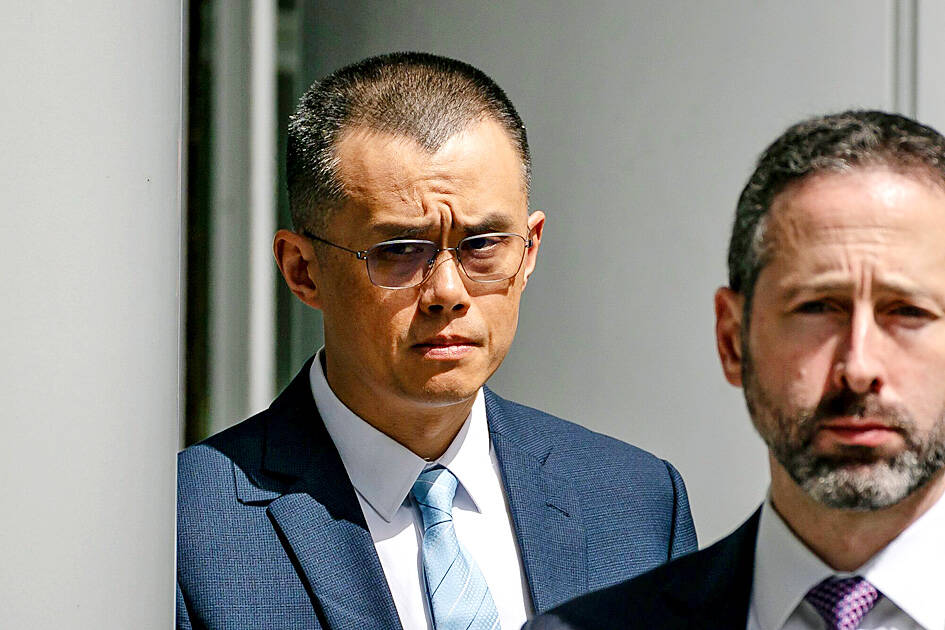Binance founder Zhao Changpeng (趙長鵬) was ordered to spend four months in prison for failures that allowed cybercriminals and terrorist groups to freely trade on the world’s largest cryptocurrency exchange.
Zhao, 47, was sentenced on Tuesday by US District Judge Richard Jones in Seattle, Washington. The billionaire’s mother and sister watched his sentencing from the front row of the courtroom.
The sentence was far below the three years requested by prosecutors, who had sought to make an example out of Zhao to a heavily scrutinized industry rebounding from a slew of high-profile scandals. It is the first time a chief executive officer has ever gone to jail for a bank secrecy act violation in the US, a charge that has been used repeatedly in crypto prosecutions in the past few years.

Photo: Bloomberg
In imposing the sentence, Jones said he hoped Zhao understood that, despite “wealth, power and status,” no person is immune from prosecution or above the law.
Zhao, who did not visibly react to the sentence, is expected to serve his four-month stint at Seattle’s Federal Detention Center, SeaTac. A date for Zhao to turn himself in to prison authorities has not been decided, although he has expressed eagerness to get back to his family in the United Arab Emirates.
In a post on X after the sentencing, Zhao said: “I will do my time, conclude this phase and focus on the next chapter of my life (education).”
He added that he “will remain a passive investor (and holder) in crypto.”
Zhao pleaded guilty in November last year for failing to implement an adequate money laundering program at Binance, an exchange that began in Shanghai in 2017 and ballooned to process trillions of dollars worth of trades each year. At the same time, Binance pleaded guilty to anti-money laundering and sanctions law violations, and agreed to pay US$4.3 billion to resolve investigations with the US department and other regulators.
US federal prosecutor Kevin Mosley said the Binance founder’s violations of US law were intentional, not an oversight.
“This wasn’t a mistake,” Mosley said. “It wasn’t a regulatory ‘oops.’”
The failure to maintain an adequate money laundering program opened the door to illicit actors, including crypto mixers, hackers and terrorist groups including al-Qaeda and Islamic State, to trade Bitcoin on the platform, Mosley said.
In an example detailed by the Financial Crimes Enforcement Network, or FinCEN, the al-Qassam Brigades, the military wing of Hamas, used Bitcoin transactions to raise money for the Palestinian resistance.
Hamas, which has been designated by the US as a terrorist organization, murdered more than 1,200 Israelis on Oct. 7 last year.
Despite Zhao’s well-publicized criminal case, he has held onto his personal fortune. His wealth ballooned by US$25 billion as the crypto industry recovered last year and he is currently ranked as the 42nd richest person worldwide, according to Bloomberg Billionaires Index.

Kehinde Sanni spends his days smoothing out dents and repainting scratched bumpers in a modest autobody shop in Lagos. He has never left Nigeria, yet he speaks glowingly of Burkina Faso military leader Ibrahim Traore. “Nigeria needs someone like Ibrahim Traore of Burkina Faso. He is doing well for his country,” Sanni said. His admiration is shaped by a steady stream of viral videos, memes and social media posts — many misleading or outright false — portraying Traore as a fearless reformer who defied Western powers and reclaimed his country’s dignity. The Burkinabe strongman swept into power following a coup in September 2022

‘FRAGMENTING’: British politics have for a long time been dominated by the Labor Party and the Tories, but polls suggest that Reform now poses a significant challenge Hard-right upstarts Reform UK snatched a parliamentary seat from British Prime Minister Keir Starmer’s Labor Party yesterday in local elections that dealt a blow to the UK’s two establishment parties. Reform, led by anti-immigrant firebrand Nigel Farage, won the by-election in Runcorn and Helsby in northwest England by just six votes, as it picked up gains in other localities, including one mayoralty. The group’s strong showing continues momentum it built up at last year’s general election and appears to confirm a trend that the UK is entering an era of multi-party politics. “For the movement, for the party it’s a very, very big

ENTERTAINMENT: Rio officials have a history of organizing massive concerts on Copacabana Beach, with Madonna’s show drawing about 1.6 million fans last year Lady Gaga on Saturday night gave a free concert in front of 2 million fans who poured onto Copacabana Beach in Rio de Janeiro for the biggest show of her career. “Tonight, we’re making history... Thank you for making history with me,” Lady Gaga told a screaming crowd. The Mother Monster, as she is known, started the show at about 10:10pm local time with her 2011 song Bloody Mary. Cries of joy rose from the tightly packed fans who sang and danced shoulder-to-shoulder on the vast stretch of sand. Concert organizers said 2.1 million people attended the show. Lady Gaga

SUPPORT: The Australian prime minister promised to back Kyiv against Russia’s invasion, saying: ‘That’s my government’s position. It was yesterday. It still is’ Left-leaning Australian Prime Minister Anthony Albanese yesterday basked in his landslide election win, promising a “disciplined, orderly” government to confront cost-of-living pain and tariff turmoil. People clapped as the 62-year-old and his fiancee, Jodie Haydon, who visited his old inner Sydney haunt, Cafe Italia, surrounded by a crowd of jostling photographers and journalists. Albanese’s Labor Party is on course to win at least 83 seats in the 150-member parliament, partial results showed. Opposition leader Peter Dutton’s conservative Liberal-National coalition had just 38 seats, and other parties 12. Another 17 seats were still in doubt. “We will be a disciplined, orderly